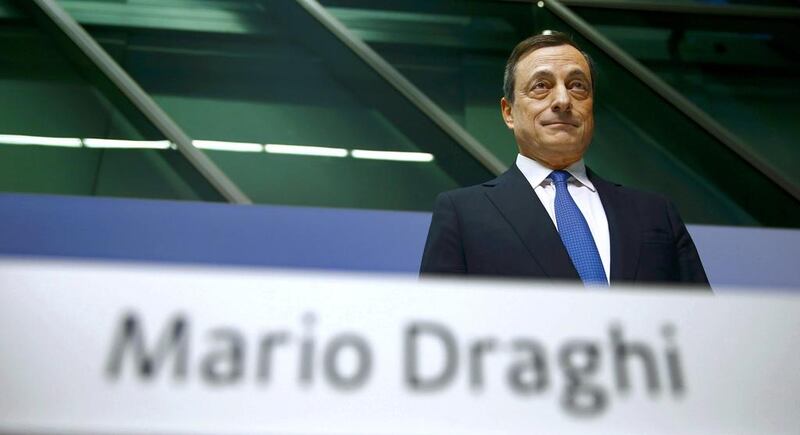The European Central Bank president Mario Draghi has finally pulled the trigger on measures to boost Europe’s flagging economy.
The ECB is to end four years of waiting with a €1.1 trillion (Dh4.63tn) quantitative easing (QE) programme, as the 19-member currency union takes a giant leap towards further economic integration, its president said.
The ECB will buy €50 billion of sovereign debt, plus €10bn of other bank assets per month until September 2016 at least, as the central bank aims to stave off disinflation and the risk of an extended period of Japan-style stagnation.
“We think these measures will be effective, will raise medium-term inflationary expectations, and will address the economic situation in the area,” Mr Draghi said.
“The ECB has taken a further, very expansionary measure today.”
The EU experienced a negative inflation rate of -0.2 per cent in December, with economic growth negligible at 0.2 per cent in the third quarter of 2014. Mr Draghi promised to persist with QE until “we see a sustained adjustment in the path of inflation”.
Economic growth in the euro zone had been “dampened by high unemployment, sizeable spare capacity, and necessary balance sheet adjustments in public and private sector”, Mr Draghi said.
“Inflation is expected to remain very low or negative in the months ahead. This is unavoidable, given the very sharp fall in oil prices.”
In the Middle East and North Africa, the Maghreb has the strongest economic ties with Europe. Trade with the continent accounts for about 20 per cent of Tunisia’s GDP, while EU trade accounts for 10 per cent of Morocco’s GDP.
“If the QE improves growth prospects, that would obviously be a positive thing for the economies of North Africa,” said Jason Tuvey, an emerging markets economist at Capital Economics.
After reports of German hostility to ECB purchases of government debt, Mr Draghi’s policy means that the majority of the risk associated with sovereign debt purchases would be borne by national governments.
National central banks will buy bonds, but 20 per cent of risk associated with declines in the value of those bonds will be pooled among euro-zone members. Mr Draghi insisted that he did not want to undermine the principle of risk-sharing.
Evidence of political hostility to the scheme emerged immediately, with Kurt Lauk, a senior figure in the German Christian Democratic Union, the ruling party led by chancellor Angela Merkel, saying that QE would be “condemned to fail”.
Mr Draghi brushed off concerns about default, saying that capital buffers at national central banks and the ECB would be sufficient in such a case.
Larry Summers, the former US treasury secretary and economic adviser to Barack Obama, told Bloomberg TV that states need to dramatically reconsider how they make monetary policy.
“The era of central bank improvisation as the principal growth strategy has to come to an end if growth is going to be maintained and enhanced in the industrial world. It has to go way beyond the provision of liquidity if we are going to avoid secular stagnation,” he said.
Jean-Claude Trichet, Mr Draghi’s predecessor as ECB president, said in an interview on CNBC that “to think that the ECB has a magic wand and will change all the situation in Europe by its magic wand, in my opinion is not the appropriate reasoning”.
The euro fell and European stocks rose immediately after the announcement. The euro declined against the dollar by 1.4 per cent, to 1.147, while the Euro Stoxx 50 price index rose 1.1 per cent.
“Even sizeable amounts of QE are unlikely to transform the outlook for the euro-zone economy and eliminate the risk of a prolonged and damaging bout of deflation,” said Jonathan Lyons, chief European Economist at Capital Economics.
abouyamourn@thenational.ae
Follow The National's Business section on Twitter





